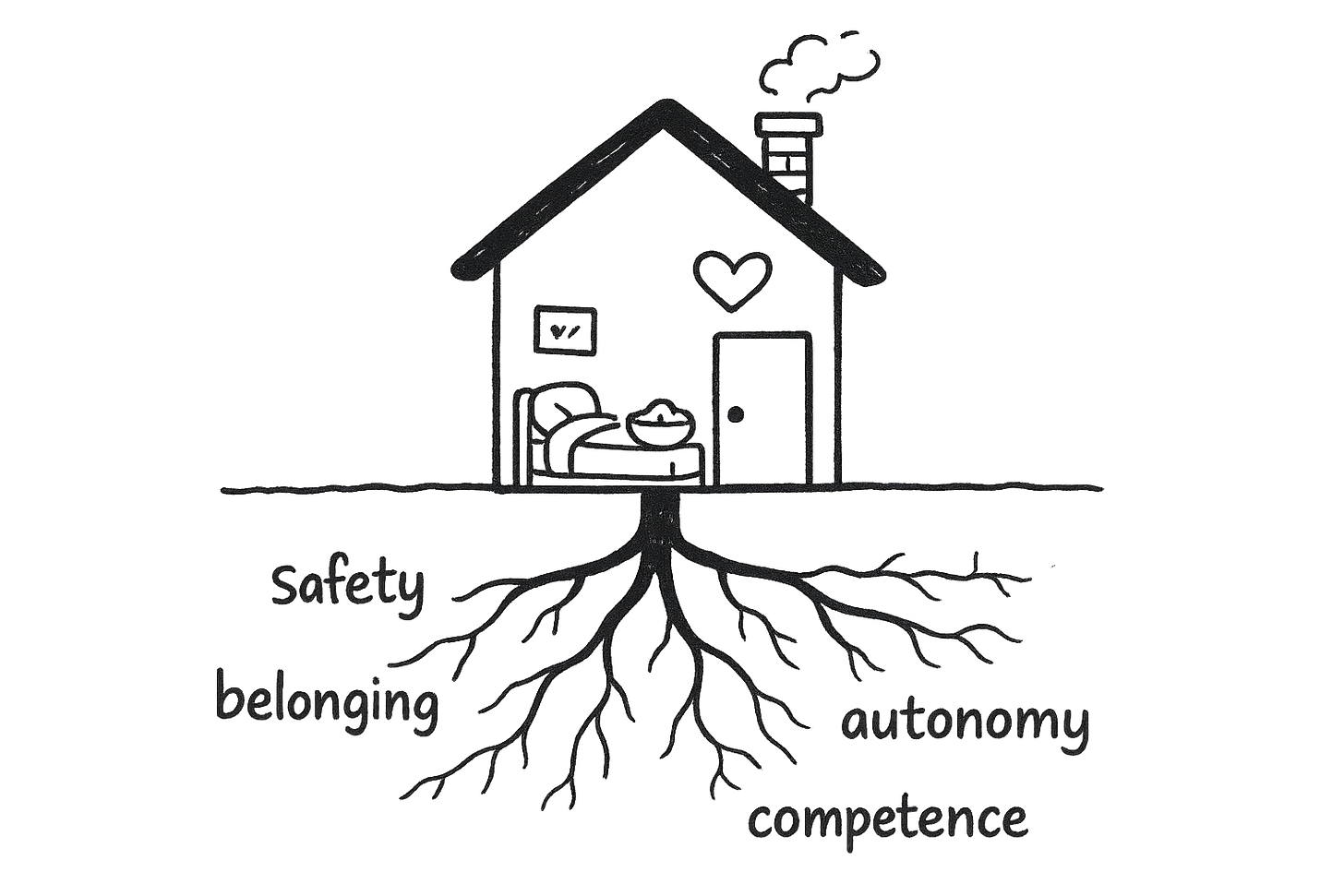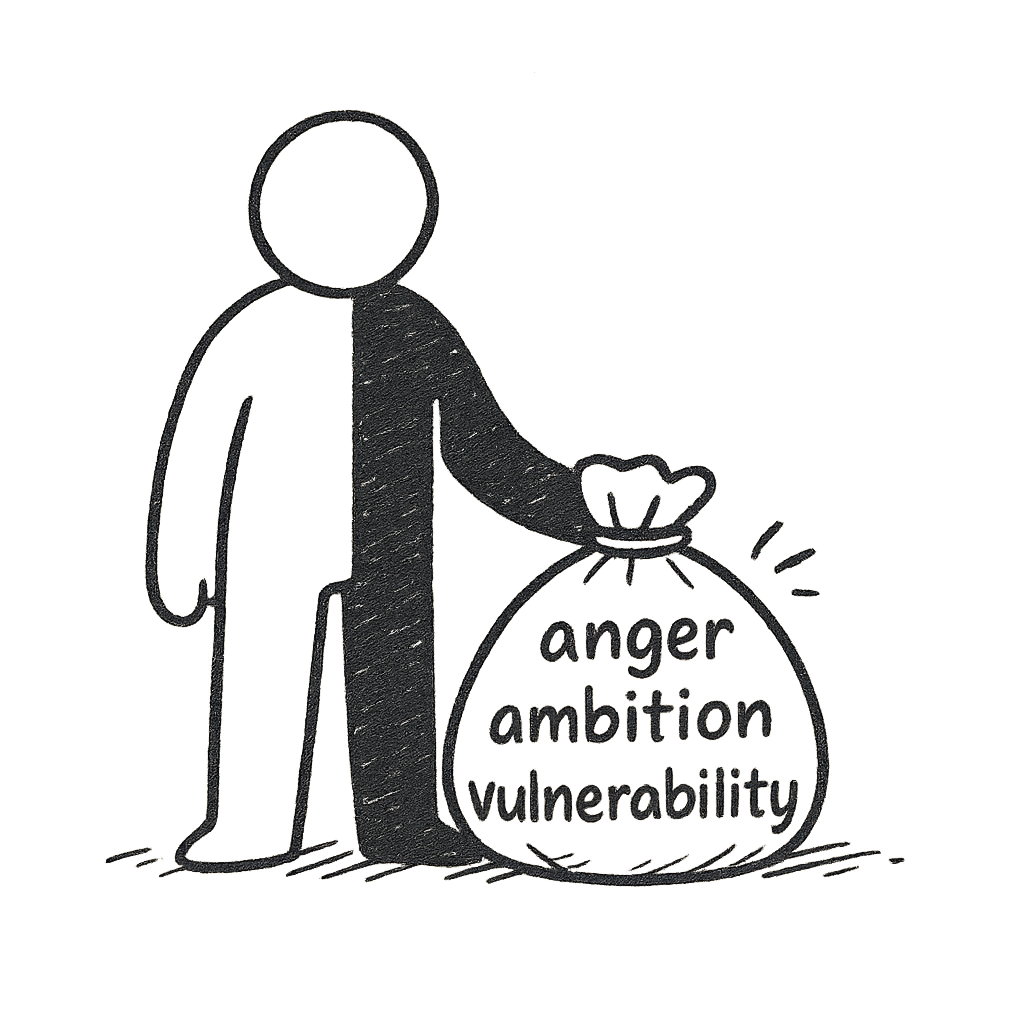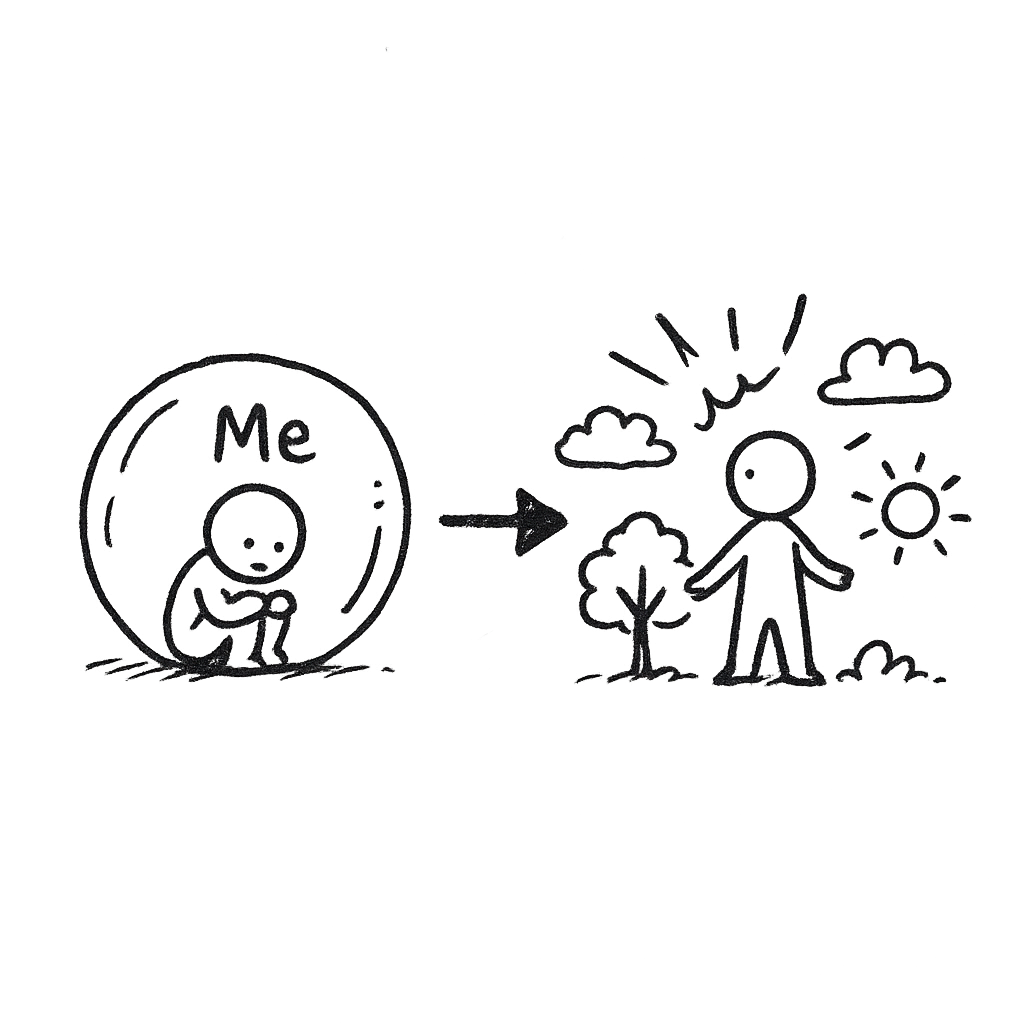Foundations of Flourishing
On the Two Pillars of Sustainable Well-being
How to Flourish 101
What does it mean to truly flourish? Not just to succeed or be happy, but to experience the deep, sustainable wellbeing that comes from living in alignment with our deepest values and highest potential?
After years of exploring this question through philosophy, psychology, and lived experience, I’ve come to believe that genuine flourishing rests on two fundamental pillars.
Pillar 1: Self-Security
Self-security is fundamentally being okay as you are. This comes from meeting core psychological needs, things like safety, belonging, autonomy, and competence, but also physiological ones like sleep, shelter, food, etc.1.
In essence, a full belly and a happy heart go hand in hand.
True self-security creates the foundation necessary for genuine growth and transformation. Carl Rogers captured this phenomenon perfectly:
“The curious paradox is that when I accept myself just as I am, then I can change.”
Flourishing requires transformation. Growth and becoming the best version of yourself requires you to approach the world and how you prioritize things in a different way. Self-security is the only foundation for truly positive change, because otherwise, you remain stuck doing things the same way you always have for one reason or another.
This is because self-security creates inner wholeness, or the capacity to hold all aspects of ourselves in compassionate awareness.
Without compassion, you’ll only create negative change. You can’t bully yourself into becoming kinder or reaching your health goals. But when you approach these desires with compassion, you can actually build sustainable habits like a nourishing diet or an exercise routine you’ll actually stick with.
Without awareness, you wouldn’t have been able to change in the first place. If you don’t cultivate some kind of understanding of your personal strengths, weaknesses, and potential growth points, then how in the world are you supposed to know where to start? You’ll only be able to grow if you truly self-assess (if you’re wondering how, don’t worry, there’s more on this later).
The psychologist Carl Jung wrote extensively about this process of individuation, or becoming whole by integrating the disparate parts of our psyche. When we exile our anger, vulnerability, ambition, etc. we push them into the shadows where they operate subconsciously, often sabotaging our conscious intention.
In other words, without the compassionate awareness that comes with self-security, we shove the worst parts of ourselves down, inadvertently pressurizing them into the core of who we are.
When we lack self-security, we’re constantly scanning our environment for threats to our self-worth. This isn’t for no reason. In fact, there was once a serious biological need for us to be this level of hypervigilant. It came from the tribalism that allowed human beings to evolve into what we are today. Being hypervigilant about our abilities was our way of ensuring that we continued to provide value to our respective tribes, avoiding being cast out, and therefore ensuring our survival.
While low self-worth now typically revolves around things that are not a matter of survival, this vestigial brain inclination is still as present as ever, and now, these threats to our self-worth trap us in a stagnation loop.
Every criticism feels personal. Every failure feels like proof of our fundamental inadequacy. We either inflate ourselves defensively or deflate ourselves preemptively, but either way, we’re not present to reality as it actually is.
Pillar 2: Pursuing Transcendence
Self-security provides the foundation, but genuine flourishing requires us to move beyond ourselves. This is what psychologist Abraham Maslow called self-transcendence, the highest human need he identified. Interestingly, he added this to his hierarchy of needs only later in life, recognizing that peak human experience comes not from self-actualization alone, but from dedicating ourselves to something larger than our individual needs.
Why does moving beyond our own lives matter so much? Because the opposite (constant self-focus) creates its own trap. Naval Ravikant puts it bluntly:
“Me is a disease.”
When we’re trapped in constant rumination about our own status, problems, and validation, we create our own suffering. Self-obsession narrows our world until everything becomes about defending, improving, or validating the self.
The paradox of transcendence is this: the less we focus on ourselves, the more we experience deeper satisfaction and become more fully ourselves. The more we flourish.
So how do you actually transcend the self? Psychologist Alfred Adler understood this deeply. He argued that the key to happiness lies in contributing to your community. This could mean raising children, volunteering at a homeless shelter, embarking on a mission to impact billions, or serving God. The specific form doesn’t matter. What matters is that your energy flows outward toward something beyond your own ego.
Transcendence doesn’t require self-sacrifice. It’s somehow both self-indulgent and selfless. When you serve something larger than yourself, it feels good. And that’s the point!
Integration
Together, self-security and transcendence liberate you from both needing others’ approval and drowning in self-focus, opening space for genuine growth and meaningful impact, aka flourishing.
Turning this into practice is where it gets messy. But thinking does nothing. It’s only when you engage with reality (when you test yourself against real challenges, real feedback, real relationships) that you actually grow. This is the most important part of the process towards flourishing.
Start with an honest assessment.
For self-security, start by understanding where you are insecure now. Do you feel confident in your ability to handle criticism without taking it personally? What about sitting with discomfort without immediately seeking distraction or validation? Notice when you’re performing for approval versus acting from genuine conviction. Notice when you avoid challenges because failure might confirm your worst beliefs about yourself.
For transcendence, what path have you actually taken toward something beyond yourself? It’s easy to say you value contribution, but have you tested that claim? What have you chosen as your outlet for transcendence? Are you trying to check yourself when your ego gets too big? The only way to know if your sense of purpose is real is to engage with it, put yourself in situations where your contribution matters and see what happens.
Then practice deliberately.
Here’s what works:
Seek honest feedback. Find people who will tell you the truth because they care enough to be honest. Ask them how you’re showing up & listen without defending.
Get uncomfortable. Try things that push you beyond your circle of competence. Apply for things you might not get. Have difficult conversations. Risk looking foolish. Honestly assessing your self security means you need to get comfortable with finding what’s uncomfortable. That way, you truly have the data points you need to improve.
Catch yourself in the moment. When you notice yourself triggered or reactive, pause and ask: “What part of me is feeling threatened right now? What does it need?” This creates space between stimulus and response.
Challenge the assumptions you make about other people. Notice what qualities in others trigger strong reactions. That person’s arrogance that irritates you? Probably a disowned part of your own healthy self-assertion. That person’s vulnerability you’re drawn to? Likely your own exiled tenderness calling to be integrated.
Practice somatic awareness. Go for walks without music, just you and an open notes app. Try yoga, breathwork, and meditation. Your body knows things your mind hasn’t caught up to yet. These practices help you develop a felt sense of security and presence that goes beyond intellectual understanding. This is also a great way to regulate your nervous system.
Create something. Whether through writing, art, music, or movement, creative expression allows different parts of you to speak. What emerges often surprises you, revealing aspects you didn’t know were there.
All of these practices follow the same pattern: engage with reality, get feedback, adjust, repeat. This process of testing your ideas and growth against real-world feedback is crucial. Without it, self-security becomes self-delusion and transcendence becomes spiritual bypassing.
There’s a LOT here so I’ve created a couple frameworks around how you can implement these principles in your life, and they will come out as essays in the future2!
The Ongoing Journey
When we develop genuine self-security and create a path towards transcendence, the effects ripple out into every area of our lives. Our relationships become more authentic3 because we’re no longer performing for approval. Our work becomes more creative because we’re not constrained by fear of failure. Our presence becomes more healing because we’re not unconsciously projecting our shadows onto others.
Perhaps most importantly, we become capable of genuine service. When we’re not constantly trying to fill our own emptiness, we have energy available to contribute to something larger than ourselves.
But this is an ongoing process of deepening and integration.
What makes this journey toward achieving personal flourishing worthwhile is the relief of not having to pretend to be someone we’re not. It’s the freedom and the joy of discovering that we’re already whole, already worthy, already enough, and that from this foundation, genuine growth and contribution become possible. And isn’t that the goal we’re all reaching toward, consciously or not, anyway?
“The privilege of a lifetime is to become who you truly are.” — Carl Jung
As I continue on this path, I’m continually amazed by how much more there is to discover. Each layer of integration reveals new possibilities. Each deepening of self-security opens new capacities for connection and creation.
If you’re reading this and feeling the call to explore these dimensions of your own experience, know that you’re not alone on this path. In that shared journey toward wholeness, we find not only our own flourishing, but our capacity to support the flourishing of others. The privilege of a lifetime might be becoming who you truly are, but truly, it’s knowing the most authentic versions of the people around you, too.
Thanks so much for reading! Shoot me a message (alex@alxmthew.com) if you have any feedback, thoughts, realizations, etc. I’d love any input!
Notes
1 There’s a whole framework of needs from various psychological theories (from Maslow’s hierarchy to Self-Determination Theory) but that’s a deeper exploration for another time
2 Coming very soon! Preview of some of the titles: “Roots of the Self,” “Inner v. Outer Game,” “Defining Fulfillment” :)
3 Secure attachment styles minimize anxious coping mechanisms (excessive reassurance-seeking, clinginess, etc.) and minimize avoidant coping mechanisms (emotional withdrawal, ghosting, etc.). The quality of your relationships will improve radically!




